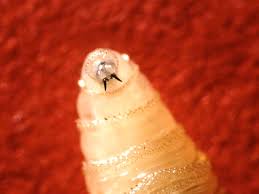New World screwworm:

The Department of Health and Human Services reported the first human case of the flesh-eating parasite, the New World screwworm, in the United States.
- Screwworms are a type of blue-grey blowfly, typically found in South America and the Caribbean.
- The parasites are named after the screw like way they burrow into the tissue.
- Screwworms specifically females are attracted to and lay eggs on and in open wounds or another entry point like a nasal cavity in warm-blooded animals and, rarely, humans.
- One female can lay up to 300 eggs at a time and may lay up to 3,000 eggs during her 10- to 30-day lifespan.
- These eggs hatch into larvae (known as maggots), which burrow into the wound using their sharp mouth hooks to feed on the living flesh, leading to infestation.
- After feeding, the larvae fall into the ground, burrow into the soil and emerge as adult screwworm flies.
- Symptoms of infestation include: wounds or sores that do not heal; bleeding from open sores; feeling larvae movement within a skin wound or sore; and a foul-smelling odour from the site of the infestation.
- Its infestations can be extremely painful, especially in humans, with a high mortality rate if left untreated.




